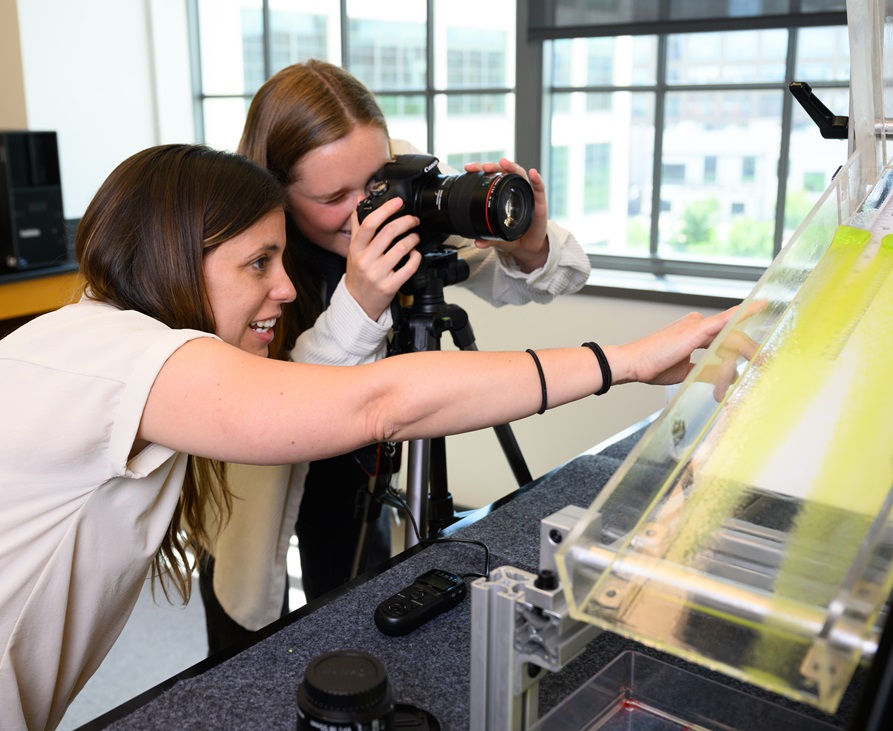Possible Student Research Topics
Projects are listed by faculty member. Please contact faculty members directly for further information.
Dr. Bourdon: My research interests lie in arithmetic geometry, which is a field in the intersection of algebraic geometry and number theory. For me, this means studying the arithmetic properties of objects coming from algebraic geometry. In particular, my research involves elliptic curves, which are examples of curves in projective space whose points can be given the structure of an abelian group. They have far-reaching applications, both in theoretical mathematics — such as in the proof of Fermat’s Last Theorem — and in information security where they form the basis of a cryptosystem commonly used to provide secure web browsing.
Coursework in modern algebra is the best preparation for doing research in this area (MTH 321 or MTH 721-722). To get a sense of student research projects I’ve advised, you can check out the theses of some of my former students: Project 1, Project 2, Project 3, Project 4, Project 5, Project 6.

Dr. Falcon: My research focuses on developing and analyzing mathematical models for fluid systems that transport particles or contaminants, such as microplastics in lakes, sediments in the ocean, or eroded particles on slopes. Using tools from fluid dynamics, differential equations, and numerical modeling, I study how small-scale interactions influence large-scale environmental behavior. Many projects connect theory with observation through experiments in our Fluids Lab at Wake Downtown, where we explore multi-phase systems. Potential student projects may involve model development and analysis, as well as experimental and computational studies of erosion, sediment transport, or fluid stability of stratified flows. Students interested in applying mathematics to understand natural systems are encouraged to reach out and/or join our regular Fluids Lab meetings to see ongoing projects in action.
Dr. Gemmer: Broadly, my research interests lie in analyzing and developing mathematical models of phenomenon in the physical and biological sciences. As an applied mathematician I find significant professional satisfaction studying “toy” models of systems which can yield concrete insights into phenomena observed in Nature. I am also particularly drawn to problems which not only have interesting and important applications but also have the potential to lead to new and deep mathematics. In my work I have developed expertise in calculus of variations, mathematical modeling, applied analysis, continuum mechanics, asymptotic methods, ordinary and partial differential equations and Riemannian geometry. I would be happy to meet with a student to discuss potential projects. Past projects I have mentored include modeling crowd dynamics, modeling the spread of infectious diseases on adaptive networks, brachistochrone problems in inverse square gravitational fields, rare events in stochastic differential equations, modeling adaptation in predator prey systems, and studying the stability of inverted pendulums, i.e. segues. A list of potential and past projects is available at http://users.wfu.edu/gemmerj/projects.html.
Dr. Jiang: 1. Network models of infectious disease: try to investigate the difference between A Markov chain model and a deterministic model. Keywords: Markov chain, rate of eradication, network model, dynamical systems. 2. Multifractal analysis of time series. Keyword: Holder exponents, Wavelet coefficients, Hausdorff dimension.
Dr. Mason: My main research interests lie at the intersection of algebra and combinatorics, aptly called “algebraic combinatorics”. Specifically, I look for ways to draw pictures and diagrams to represent algebraic concepts and constructions, especially those involving polynomials with some sort of symmetry. These diagrams can often simplify the algebra and pave the way for the discovery of new formulas and theorems. I am also open to exploring projects suggested by students and have mentored projects involving graph theory, game theory, and biological applications of combinatorics. Check out my website https://sites.google.com/wfu.edu/sarahmason/student-research to see examples of some previous student research projects.
Dr. Raynor: I’m open to working on any topic in the general areas of analysis, differential equations, and differential geometry. Some areas on which I’ve worked with students before are traffic modeling, free boundary problems, DNA solitary wave modeling, fractals, and ranking theory.
Dr. Robinson: I am interested in many analysis based problems dealing with Differential Equations or Difference Equations. Here, I provide brief introductions to a few of these problems. Any student with a background that includes Multivariable Calculus and Linear Algebra can get started. If you have taken courses such as Ordinary Differential Equations, Partial Differential Equations, or Real Analysis, then the doors are open to many more problems. The more you know, and the more you are willing to learn along the way, the deeper you can dive.
Dr. Rouse: Rather than indicate a specific project, I prefer to decide on a project after talking with a student about their interests and background. That said, all the projects I am likely to suggest are in number theory.
